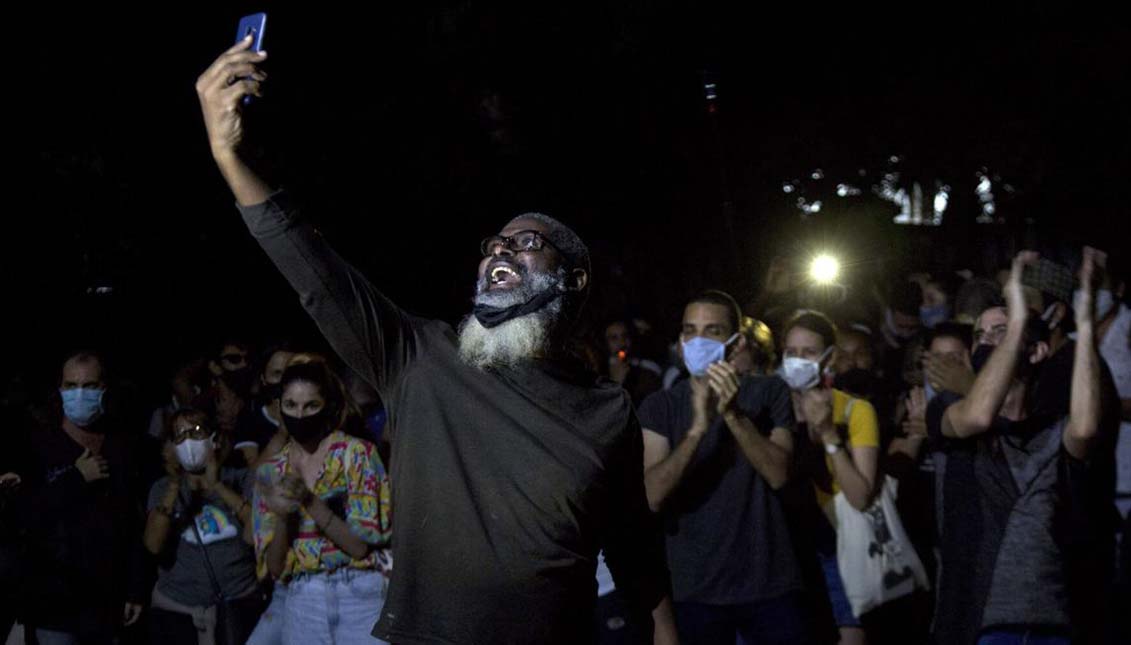
The protest that sparked dialogue between artists and the Cuban government
Members of the San Isidro Movement met with Vice Minister Rojas on Saturday in what was the first step towards freedom of expression on the island. Is there…
Just 24 hours after a massive protest last Friday, Nov. 27 at the Cuban Ministry of Culture against the forced eviction of a house in Old Havana where some 15 artists and activists from the San Isidro Movement stayed, a group of dissident artists, including Tania Bruguera and journalist Katherine Bisquet, played a leading role in a historic moment in modern Cuban history.
The vice-minister of culture, Fernando Rojas, received them on Saturday, Nov. 28 for a four-hour meeting. After, Rojas committed himself to "open a channel of dialogue" with the creators so they can express themselves without being "criminalized" or "harassed." He also promised to examine the situation of the rapper Denís Solís, condemned to eight months in prison for contempt, and that of Luis Manuel Alcántara, who is on a hunger strike and his health at a breaking point.
"This is a special flame that was lit here today," activist and music promoter Michel Matos, who participated in the meeting with Rojas, told Reuters. "We talked about freedom of expression, freedom of association, censorship and physical repression. I don't think there has been a dialogue like this in a ministerial space in 60 years."
While the artists congratulated themselves on this new open path, they continued to denounce other arrests, such as that of the musician Didier Almagro, sentenced to three years in prison on Nov. 13 for public disorder and his alleged participation in a demonstration against power cuts in August 2019.
"I don't think there has been a dialogue like this in a ministerial space in 60 years"
According to Sverre Pedersen, campaign manager for Freemuse, a nongovernmental organization that fights for artists' freedom of expression, these arrests and sentences violate the United Nations' International Covenant on Civil and Political Rights, which Cuba is a part of.
"We demand that the Cuban authorities release these artists from prison and drop all charges against them," Pedersen said.
For 10 days without a break, members of the San Isidro Movement, which fights for artistic freedom in Cuba and to which rapper Denis Solis belongs, had been protesting from the house in Old Havana.
On Thursday, Nov. 26, the police evicted the 14 members who were being held, some of them on hunger strike. The excuse given was that they were violating the restrictions imposed by the pandemic, since one had returned from Mexico without quarantining.
"They entered by force, breaking the door," said independent journalist Iliana Hernández, who broadcast the eviction on Facebook Live. "Many military personnel dressed as if they were doctors, with gowns."
After the raid, the 14 members of San Isidro were forced to undergo a COVID-19 test and the headquarters of the collective was closed by authorities, the activists reported on social media.
However, two of them, Manuel Otero Alcántara and Anamely Ramos, refused to return to their homes and were arrested. The organization Amnesty International came forward as soon as the news broke and called for their release, claiming they were "prisoners of conscience, imprisoned solely for their conscious beliefs."
RELATED CONTENT
Rapper Denis Solis, a member of the San Isidro Movement, is sentenced to eight months in prison for contempt.
Then, the unthinkable happened on an island where the government exercises tight control and severely punishes anyone who tries to oppose them:
On Thursday night, nearly 300 people, including well-known figures in the arts and cinema such as actor Jorge Perugorría (Strawberry and Chocolate) and director Fernando Pérez (Havana Suite), gathered in front of the Ministry of Culture demanding "dialogue" with the government.
"We are here to tell you that you are welcome, that this is going to be the beginning of a new language that Cuban culture lacks," said Pérez to the rest of the demonstrators. Perugorría declared shortly before the hearing was granted that "it is time to dialogue and I believe that you, the young people, must be heard."
The outcry was also felt in the United States, through State Department official Michael Kozak, who said on Twitter that "the international community is demanding that the regime respect Cuba's human rights."
Meanwhile, a heated debate was taking place on social media, where defenders of the Cuban government claimed that the San Isidro Movement was being manipulated by anti-Castro sectors in Miami and by the Trump Administration, and they wanted was to provoke an incident followed by the foreign press and thus achieve diplomatic legitimacy for embassies.
The San Isidro Movement has been fighting for artistic freedom and expression in Cuba and against the arbitrary detention of artists since 2018, and thanks to growing access to the Internet, its message is reaching a wider audience.
Now, social media is marking the pulse of a rebellion against the multiple repressions and the censorship of the Cuban media.
However, is it really a shift towards the concord of the Cuban regime? The promise of future talks makes one think so, but only time and action will allow celebration of change.











LEAVE A COMMENT:
Join the discussion! Leave a comment.